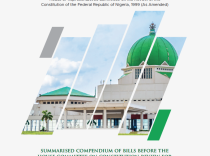The Bills for an Act to provide a legal framework for cost and benefit sharing amongst the Government, Petroleum Exploration Companies and Petroleum Host Communities (SB 404); Establish a Fiscal Framework that encourages further investment in the Petroleum Industry whilst increasing accruable revenues to the Federal Government (SB 472); provide for the administrative framework for the Petroleum Industry (SB 540) passed second reading in the Senate.
Leading the debate on the Petroleum Host Community Bill, 2017 (SB 404), sponsor of the Bill Sen. Kabiru Marafa (APC: Zamfara) explained that it will include direct funding for the development of the Petroleum Host Communities under the powers and control of the host community. Sen. Marafa also noted that the bill if enacted, would create partnership among various stakeholders and transform the oil and gas industry.
Furthermore, he informed Members of the Senate that the Bill formed part of the legislative reform of the petroleum industry and is in line with the perspective of the 8th Senate to divide the Petroleum Industry Governance Bill into different units for apt consideration, passage and where necessary, future amendments.
The highlights of the Bill include:
- Curbing the agitation in the Niger Delta region by providing a veritable rule for compensation, creating access to healthcare and restore the devastated environment caused by poorly managed activities of oil companies;
- Establishing a pool of funding for developing petroleum host communities and specifying sources of funding;
- Providing funds for host Communities through direct contribution from petroleum producing companies;
- Identifying communities eligible to benefit from the funds which shall be expended on socio-economic development, infrastructure, education etc;
- Defining ratios of distribution of benefits among different categories of the communities;
- Setting out requirements for accounts and audit of funds paid to the Petroleum Host Community Associations; and
- Creating a National Committee on Petroleum Host Communities which shall be empowered to carry out specified tasks in accordance to the various community funds created under the Bill.
In line with the aforementioned, he emphasized that the Bill will attract substantial investment to the Nigerian oil and gas industry.
Speaking on the Petroleum Industry Fiscal Framework Bill, 2017 (SB 472) Sen. Omotayo Alasoadura (APC: Ondo) stated that the Bill comprised of various legal instruments. That is the, Petroleum Profit Tax Act, 1990; Petroleum Act, 1990; Deep Offshore and Inland Basin Production Sharing Contracts Act, 1999; Memorandum of Understanding (MoU) between industry operators and government 1986; Finance (Miscellaneous Taxation Provisions) Decrees 1996-1999; and Companies Income Tax Act, 2007 used in accumulating rent and revenues from companies operating in the petroleum upstream and downstream sector.
Sen. Alasoadura noted that the bill would develop a sustainable and integrated petroleum sector for socio-economic development of Nigeria. He also explained the objectives of the Bill to include:
- Establishing a progressive fiscal framework that encourages substantial rewards while enhancing revenues to the Federal Government;
- Instituting a framework that shall be based on core principles of clarity, neutrality and accessibility; and
- Providing a clear distinction between legislative fiscal regimes and negotiable aspects of contractual obligation.
Some of the highlights of the Bill include:
- Making provisions for the fiscal terms and instruments for the entire petroleum industry value chain;
- Providing general terms for exploration and production companies that may wish to expand the frontiers of their scope of operations;
- Offering new rates for rents on land covered by petroleum exploration, prospecting and mining licenses and leases.
Lastly, speaking on the Petroleum Industry Administration Bill, 2017 (SB 540) Sen. Bassey Akpan (PDP: Akwa Ibom) sponsor of the Bill said that the Bill provided a new legal framework for the administration of the upstream, midstream and downstream sectors of the Nigerian Petroleum Industry.
Sen. Akpan described the Bill as further seeking to provide effective administration of the entire industry and to allow for investment and growth. According to him, the objectives of the Bill are as follows:
- To create a robust legal framework for the administration of upstream licenses and leases;
- To provide regulations for the organization of the midstream operations and gas market; and
- To define procedures for administration of licensing and operations of the downstream sector.
Furthermore, he noted that the bill if passed will reform the administration of the upstream sector by providing an appropriate and transparent management system for licenses and lease award; create an effective regime with protection consumer rules and market regulations among others.
The Bills have been referred to the Committees on Gas, Petroleum Upstream and Petroleum Downstream for further legislative input and will be expected to report back in four weeks.





